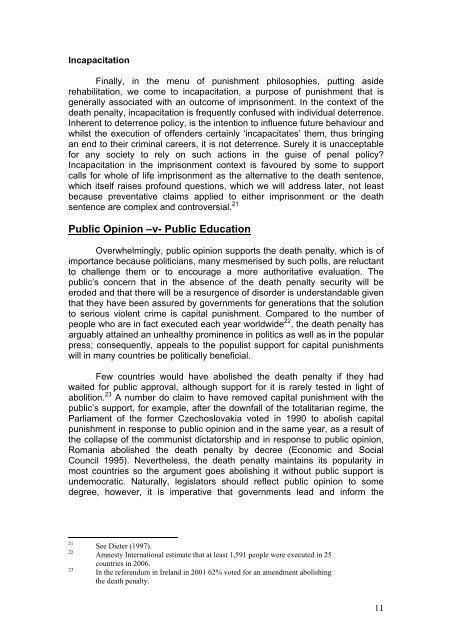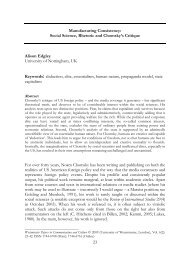IncapacitationFinally, in the menu <strong>of</strong> punishment philosophies, putting asiderehabilitation, we come to incapacitation, a purpose <strong>of</strong> punishment that isgenerally associated with an outcome <strong>of</strong> imprisonment. In the context <strong>of</strong> thedeath penalty, incapacitation is frequently confused with individual deterrence.Inherent to deterrence policy, is the intention to influence future behaviour andwhilst the execution <strong>of</strong> <strong>of</strong>fenders certainly ‘incapacitates’ them, thus bringingan end to their criminal careers, it is not deterrence. Surely it is unacceptablefor any society to rely on such actions in the guise <strong>of</strong> penal policy?Incapacitation in the imprisonment context is favoured by some to supportcalls for whole <strong>of</strong> life imprisonment as the alternative to the death sentence,which itself raises pr<strong>of</strong>ound questions, which we will address later, not leastbecause preventative claims applied to either imprisonment or the deathsentence are complex and controversial. 21Public Opinion –v- Public EducationOverwhelmingly, public opinion supports the death penalty, which is <strong>of</strong>importance because politicians, many mesmerised by such polls, are reluctantto challenge them or to encourage a more authoritative evaluation. Thepublic’s concern that in the absence <strong>of</strong> the death penalty security will beeroded and that there will be a resurgence <strong>of</strong> disorder is understandable giventhat they have been assured by governments for generations that the solutionto serious violent crime is capital punishment. Compared to the number <strong>of</strong>people who are in fact executed each year worldwide 22 , the death penalty hasarguably attained an unhealthy prominence in politics as well as in the popularpress; consequently, appeals to the populist support for capital punishmentswill in many countries be politically beneficial.Few countries would have abolished the death penalty if they hadwaited for public approval, although support for it is rarely tested in light <strong>of</strong>abolition. 23 A number do claim to have removed capital punishment with thepublic’s support, for example, after the downfall <strong>of</strong> the totalitarian regime, theParliament <strong>of</strong> the former Czechoslovakia voted in 1990 to abolish capitalpunishment in response to public opinion and in the same year, as a result <strong>of</strong>the collapse <strong>of</strong> the communist dictatorship and in response to public opinion,Romania abolished the death penalty by decree (Economic and SocialCouncil 1995). Nevertheless, the death penalty maintains its popularity inmost countries so the argument goes abolishing it without public support isundemocratic. Naturally, legislators should reflect public opinion to somedegree, however, it is imperative that governments lead and inform the212223See Dieter (1997).Amnesty International estimate that at least 1,591 people were executed in 25countries in 2006.In the referendum in Ireland in 2001 62% voted for an amendment abolishingthe death penalty.11
debate, not hide behind the views <strong>of</strong> a largely ill-informed majority. Nobodysuggests, for example, that fiscal policy should be lead by popular opinion. 24It is not uncommon for decisions about capital punishment to betransferred from elected representatives to the judiciary, as not only politiciansrely on public opinion polls. Courts may also refer to them as an indication <strong>of</strong>public support. 25 Rulings on the constitutionality <strong>of</strong> capital punishment mayinvolve conceptual terms such as ‘cruel’, ‘inhuman’ or ‘degrading’, all subjectto subjective interpretation varying between different societies and evolvingover time with public opinion being taken into account in this process. 26However, it should not be relied upon too heavily as the purpose <strong>of</strong> humanrights is to protect the individual, regardless <strong>of</strong> the views <strong>of</strong> the majority. InThe State v Makwanyane 27 the Constitutional Court <strong>of</strong> South Africa,commenting on the significance <strong>of</strong> public opinion, held that the purpose <strong>of</strong> thesystem was to protect minorities and the marginalised in the democraticprocess and ‘if public opinion were to be decisive there would be no need forconstitutional adjudication’. 28 Practices which are now found to be deplorableonce had widespread support and part <strong>of</strong> a mature democracy is a properlyfunctioning judicial system where the legitimacy <strong>of</strong> law can be tested.Regular polls have been undertaken on the death penalty in the USsince the 1930s with 1966 standing out as the only year when the oppositionto the death penalty was greater than the support. 29 Notably, this was just afew years before Furman v Georgia 30 in which Supreme Court JusticeThurgood Marshall stated, ‘the question with which we must deal is notwhether a substantial proportion <strong>of</strong> American citizens would today, if polled,opine that capital punishment is barbarously cruel, but whether they wouldfind it to be so in the light <strong>of</strong> all information presently available’. 31 Thishypothesis has to some extent been tested. In studies undertaken in the USrespondents were presented with various issues in relation to the deathpenalty, such as the mental condition <strong>of</strong> the <strong>of</strong>fender, disproportionatesentencing based on race or financial status, innocent people beingsentenced to death and the availability <strong>of</strong> life without parole. With each2425262728293031Schabas, W. A. (2004), ‘Public Opinion and the death penalty’ in Hodgkinson, P. andSchabas, W. A. (eds), Capital Punishment – Strategies for Abolition (Cambridge: Cambridge<strong>University</strong> Press)Schabas, W. A. (2004), ‘Public Opinion and the death penalty’ in Hodgkinson, P. andSchabas, W. A. (eds), Capital Punishment – Strategies for Abolition (Cambridge: Cambridge<strong>University</strong> Press)Schabas, W. A. (2004), ‘Public Opinion and the death penalty’ in Hodgkinson, P. andSchabas, W. A. (eds), Capital Punishment – Strategies for Abolition (Cambridge: Cambridge<strong>University</strong> Press)State v Makwanyane & Anr (1995) 6 BCLR 665State v Makwanyane & Anr (1995) 6 BCLR 665 [paragraph 88]Newport, F. (2007), ‘Sixty-Nine Percent <strong>of</strong> Americans Support Death Penalty’, Gallup NewsService [website], published 12 October 2007, available at:http://www.gallup.com/poll/101863/Sixtynine-Percent-Americans-Support-Death-Penalty.aspx,Furman v. Georgia, 408 U.S. 238 (1972)Furman v. Georgia, 408 U.S. 238 (1972) [paragraph 362]12
- Page 1 and 2: CAPITAL PUNISHMENTBRIEFING PAPERPet
- Page 3 and 4: PETER HODGKINSON, OBEDirector, Cent
- Page 5 and 6: Subsequently, she worked at the Cen
- Page 7 and 8: Preamble 1The objective of this bri
- Page 9 and 10: a unique deterrent, 3] the administ
- Page 11: effects’ are not uncommon even in
- Page 15 and 16: place with tougher institutions for
- Page 17 and 18: supported capital punishment. The p
- Page 19 and 20: Death Penalty for MurderRed = major
- Page 21 and 22: prosecutors had withheld evidence,
- Page 23 and 24: By comparison, Europe is almost ent
- Page 25 and 26: have very low rates of recidivism a
- Page 27 and 28: It will be interesting to see how t
- Page 29 and 30: While some death penalty opponents
- Page 31 and 32: manifest itself in the often violen
- Page 33 and 34: death row, which was more than the
- Page 35 and 36: would be to obtain a complete suspe
- Page 37 and 38: developed largely through the impro
- Page 39 and 40: Religion and capital punishment[sec
- Page 41 and 42: automatically. For example, in case
- Page 43 and 44: punishment is to be administered, i
- Page 45 and 46: money). Given the victim-orientated
- Page 47 and 48: certifying death, removing organs f
- Page 49 and 50: The WPA held that “the participat
- Page 51 and 52: Mental health and the death penalty
- Page 53 and 54: sparse and apparently limited to ge
- Page 55 and 56: Table 2: Elements of death penalty
- Page 57 and 58: squad on the grounds that beheading
- Page 59 and 60: It was on the grounds of physician
- Page 61 and 62: The Protocol to the American Conven
- Page 63 and 64:
is an integral part of the state, t
- Page 65 and 66:
The Jamaican debate has taken place
- Page 67 and 68:
Privy Council 252 describing the ef
- Page 69 and 70:
sentence. 274 Those were sentences
- Page 71 and 72:
The situation in MoroccoLegal Syste
- Page 73 and 74:
continue to pass death sentences, P
- Page 75 and 76:
Prison conditionsThe conditions of
- Page 77 and 78:
people were sentenced to death in E
- Page 79 and 80:
In Mali, the mandatory waiting peri
- Page 81 and 82:
Execution data and processIn Vietna
- Page 83 and 84:
Drugs and the death penalty - confu
- Page 85 and 86:
1.2% of Indonesia’s 210 million p
- Page 87 and 88:
APPENDIX ONESTATUS OF THE DEATH PEN
- Page 89 and 90:
NEPAL 1997 1990 1979NETHERLANDS 198
- Page 91 and 92:
The Russian Federation introduced a
- Page 93 and 94:
De Facto abolitionist*Korea (South)
- Page 95 and 96:
Guinea R R R N R RGuinea b S S R S
- Page 97 and 98:
Thailand R R R R R RYugoslav R R R
- Page 99 and 100:
violent crimes such as rape, murder
















